A Fistful of Dollars (1964): a legend is born | nace una leyenda [ENG | ESP]

Una de las películas más icónicas de la historia
Few film careers can compare with that of Clint Eastwood. With more than sixty years of career, the actor, director, producer and musician has, among other records, won the Oscar for Best Director and Best Picture twice, with Unforgiven and Million Dollar Baby; besides having left us - as a director - gems like Mystic River, American Sniper, Grand Torino and that story of world war II in two perspectives that make up Flags of our Fathers and Letters from Iwo Jima.
Pocas carreras cinematográficas pueden compararse con la de Clint Eastwood. Con más de sesenta años de trayectoria, el actor, director, productor y músico tiene, entre otros récords, haber conseguido el Oscar a Mejor Director y a Mejor Película en dos oportunidades, con Unforgiven y con Million Dollar Baby; además de habernos dejado - como director - joyas como Mystic River, American Sniper, Gran Torino y esa historia de la segunda guerra en dos perspectivas que conforman Flags of our Fathers y Letters from Iwo Jima.
But as an actor he also left us memorable performances and characters such as detective Harry Callahan (“Dirty Harry”), photographer Robert Kincaid in The Bridges of Madison County and the man with no name, the most feared and famous gunslinger of all westerns. Even if you haven't seen it, I'm sure you've all heard mention of the western The Good, the Bad and the Ugly and surely recognize that famous tune composed by Ennio Morricone. Well, that movie is part of a sort of trilogy whose first installment, released in 1964, was called A Fistful of Dollars. In it Eastwood plays Joe, a wandering gunfighter who arrives in a town on the U.S.-Mexico border where control of power and territory is in the hands of two families. One controls alcohol smuggling and the other arms smuggling. The sheriff and law enforcement are on the sidelines and the town's few inhabitants have become accustomed to living under the domination of one family or the other or - as the tavern keeper does - to living their lives on the fringes of both groups. And then Joe comes along with an idea: he wants one of the two families to hire him to take down the rival family, who does he prefer? It's all the same to Joe. He doesn't want to do it to defend a cause or a group, but simply for the sake of practicing his infallible aiming and obviously also to make some money.
Pero como actor también nos dejó actuaciones y personajes memorables como el detective Harry Callahan (Harry "el sucio"), el fotógrafo Robert Kincaid en The Bridges of Madison County y el hombre sin nombre, el pistolero más temido y famoso de todas las películas de vaqueros. Aunque no la hayan visto, estoy seguro de que todos han oído mencionar el western El bueno, el malo y el feo y seguramente reconozcan esa famosa melodía compuesta por Ennio Morricone. Bueno, esa película forma parte de una especie de trilogía cuya primera entrega, estrenada en 1964, se llamó A Fistful of Dollars. En ella Eastwood interpreta a Joe, un pistolero errante que llega a un pueblo en la frontera entre EEUU y México en donde el control del poder y del territorio está en manos de dos familias. Una controla el contrabando de alcohol y la otra el contrabando de armas. El alguacil y las fuerzas públicas están de adorno y los pocos habitantes del pueblo se han acostumbrado a vivir dominados por una u otra familia o - como hace el tabernero - a hacer su vida al margen de ambos grupos. Y entonces llega Joe con una idea: quiere que alguna de las dos familias lo contrate para acabar con la familia rival, ¿a quiénes prefiere? A Joe le da lo mismo. No lo quiere hacer por defender una causa o a un grupo, sino simplemente por el hecho de poner en practica su infalible puntería y obviamente también para ganar algún dinero.
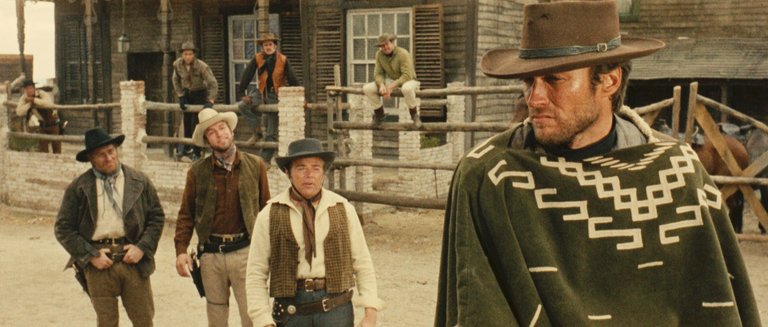
If you have never seen a gunfighter movie and you imagine a character who is short on words, but ironic, with an unreal aim, a tough guy character and a half-hearted hero, that is, the stereotype of the hero of this kind of movies, well, that's Joe. The western was a very famous genre at the time when these films appeared, but it can not be denied that it was from that collaboration between director Sergio Leone, Clint Eastwood and composer Ennio Morricone, that characters like Joe began to flood the billboards and the collective imagination of viewers.
Si nunca han visto una película de pistoleros y se imaginan a un personaje parco en palabras, pero irónico, con una puntería irreal, carácter de tipo duro y medio gatillo alegre, es decir el estereotipo del héroe de este tipo de películas, bueno, así es Joe. El western era un género muy famoso en la época en que aparecieron estas películas, pero no se puede negar que fue a partir de esa colaboración entre el director Sergio Leone, Clint Eastwood y el compositor Ennio Morricone, que personajes como el de Joe comenzaron a inundar las carteleras y el imaginario colectivo de los espectadores.
Today, westerns seem like an anachronism, like something out of fashion, but I think a good movie, whatever genre it is, is truly timeless. Watching A Fistful of Dollars sixty years after its release is a great experience because it's a great movie. Point. Chases, shootouts, duels, escapes, horseback riding, bare-knuckle fistfights, fires, ambushes, plot twists, are basic, but effective components in telling the story. I, for one, am not a big fan of action movies, but this Leone trilogy has a particular charm that makes you get hooked on the plot and get attached to the protagonist, despite his arrogance. Add to that the immortal songs by one of the greatest composers in history and the exquisite cinematography by Massimo Dallamano, and you get a film that is as enjoyable today as it was twenty, forty or sixty years ago. You don't have to be a western lover to enjoy this one, especially because the script holds a couple of surprises and mixes individual themes with collective themes in a very moving dynamic among a bunch of characters among whom there doesn't seem to be even one good character: they're all evil. Or worse. The protagonist himself is not a typical hero, he's an assassin who kills people almost for fun, which is not good, even if he concentrates on killing criminals.
Hoy día, las películas de vaqueros parecen un anacronismo, como algo pasado de moda, pero creo que una buena película, sea del género que sea, es verdaderamente atemporal. Ver A Fistful of Dollars sesenta años después de su estreno es una gran experiencia porque se trata de una gran película. Punto. Persecuciones, balaceras, duelos, huidas, cabalgatas, peleas a puño limpio, incendios, emboscadas, giros en la trama, son componentes básicos, pero efectivos a la hora de contar la historia. A mí, por ejemplo, no me gustan mucho las películas de acción, pero esta trilogía de Leone tiene un encanto particular que hace que uno se enganche con la trama y se encariñe con el protagonista, a pesar de su arrogancia. Si a eso sumamos las canciones inmortales de uno de los mayores compositores de la historia y la exquisita fotografía de Massimo Dallamano, obtenemos una película tan disfrutable hoy como hace veinte, cuarenta o sesenta años. No hace falta ser amante de los western para disfrutar este, en especial porque el guion guarda un par de sorpresas y mezcla temas individuales con temas colectivos en una dinámica muy movida entre un montón de personajes entre los que parece no haber ni siquiera un personaje bueno: todos son malos. O peores. El mismo protagonista no es un héroe típico, es un asesino que dedica a matar personas casi por diversión lo que no está nada bien, por más que se concentre en matar criminales.

One of the curiosities of this film is that there was a legal dispute for plagiarism, since A Fistful of Dollars practically copied the central plot of a film that had been released a few years earlier, Yojimbo by the legendary Akira Kurosawa. The setting is different, the era is different, but the plot of the lone fighter arriving at a town in dispute between two clans and many of the things that happen afterwards were already present in Yojimbo before being included in Sergio Leone's film, who said that it was a tribute to the great Japanese director.
Una de las curiosidades de esta película es que hubo una disputa legal por plagio, ya que A Fistful of Dollars prácticamente se copió el argumento central de una película que se había estrenado pocos años antes, Yojimbo del mítico Akira Kurosawa. La ambientación es diferente, la época también, pero la trama del luchador solitario llegando a una localidad en disputa entre dos clanes y muchas de las cosas que suceden después, ya estaban presentes en Yojimbo antes de ser incluidas en la película de Sergio Leone quien dijo que se trataba de un homenaje al gran director japonés.
The dispute was settled out of court, but the plagiarism scandal didn't diminish the popularity of the western version which is now considered by many to be a remake of the original story. That's how good it is. I recently read Abel by Alessandro Baricco, one of my favorite writers, and it's a very entertaining western that I could imagine thanks to having seen things like The Hateful Eight, Butch Cassidy and the Sundance Kid, Django or the aforementioned Unforgiven, but after having seen this trilogy of the man with no name I feel like rereading the novel because I think now I will be able to feel even more the soul of that story. I don't know if you've read novels or tales of gunslingers, if you've ever seen things like The Lone Ranger, or if you remember The Quick and the Dead, a western (not a very good one) with Sharon Stone, Gene Hackman, Russell Crowe and Leonardo DiCaprio, under the direction of Sam Raimi, but I'll be honest: you don't need to. If you approach this film without the prejudice that it's an old movie and without looking to compare it with Netflix or Prime tapes, you will be surprised at how well composed the music is, how visionary that photography was with wide shots where the character is just a dot in the vastness of the landscape (although this was also done by Kurosawa in Yojimbo) and how memorable Clint Eastwood is as a tough, arrogant, insolent and above all lethal cowboy. I assure you that once you finish the film you will be left wanting to see more and that's the best news of all: there are two other stories with the same collaborators, have you seen A Fistful of Dollars? what did you think? I'll read you in the comments.
La disputa se resolvió fuera de la corte, pero el escándalo del plagio no disminuyó la popularidad de la versión western que ahora está considerada por muchos como un remake de la historia original. Así de buena es. Hace poco leí Abel de Alessandro Baricco, uno de mis escritores favoritos, y es un western muy entretenido que pude imaginar gracias a que había visto cosas como The Hateful Eight, Butch Cassidy and the Sundance Kid, Django o la ya mencionada Unforgiven, pero después de haber visto esta trilogía del hombre sin nombre tengo ganas de releer la novela porque creo que ahora podré sentir aún más el alma de esa historia. No sé si ustedes hayan leído novelas o cuentos de pistoleros, si alguna vez hayan visto cosas como El llanero solitario, o si recuerden The Quick and the Dead, un western (no muy bueno) con Sharon Stone, Gene Hackman, Russell Crowe y Leonardo DiCaprio, bajo la dirección de Sam Raimi, pero les soy sincero: no hace falta. Si se acercan a esta película sin el prejuicio de que es una película antigua y sin buscar compararla con las cintas de Netflix o Prime, se sorprenderán de lo bien compuesta que está la música, de lo visionaria que era esa fotografía con planos amplios donde el personaje es apenas un punto en la vastedad del paisaje (aunque esto también lo hizo Kurosawa en Yojimbo) y de lo memorable que resulta Clint Eastwood como un vaquero duro, arrogante, insolente y sobre todo letal. Les aseguro que una vez terminada la película quedarán con ganas de ver más y esa es la mejor noticia de todas: hay otras dos historias con los mismos colaboradores, ¿han visto A Fistful of Dollars? ¿qué les pareció? Los leo en los comentarios.
Reviewed by | Reseñado por @cristiancaicedo
Other posts that may interest you | Otros posts que pueden interesarte:
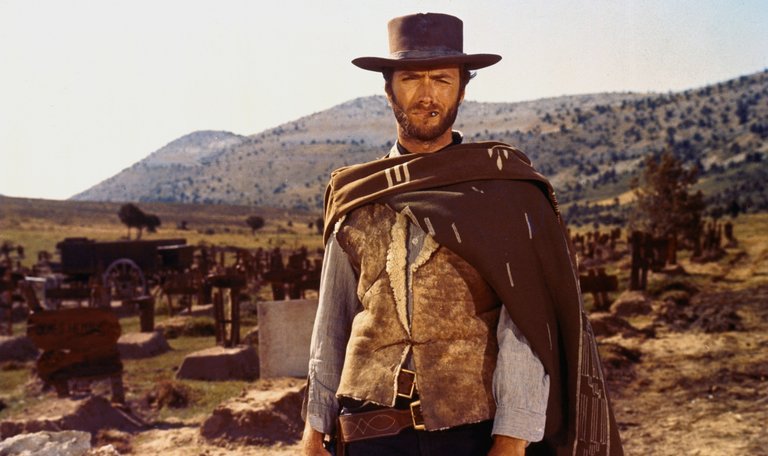 |
|---|
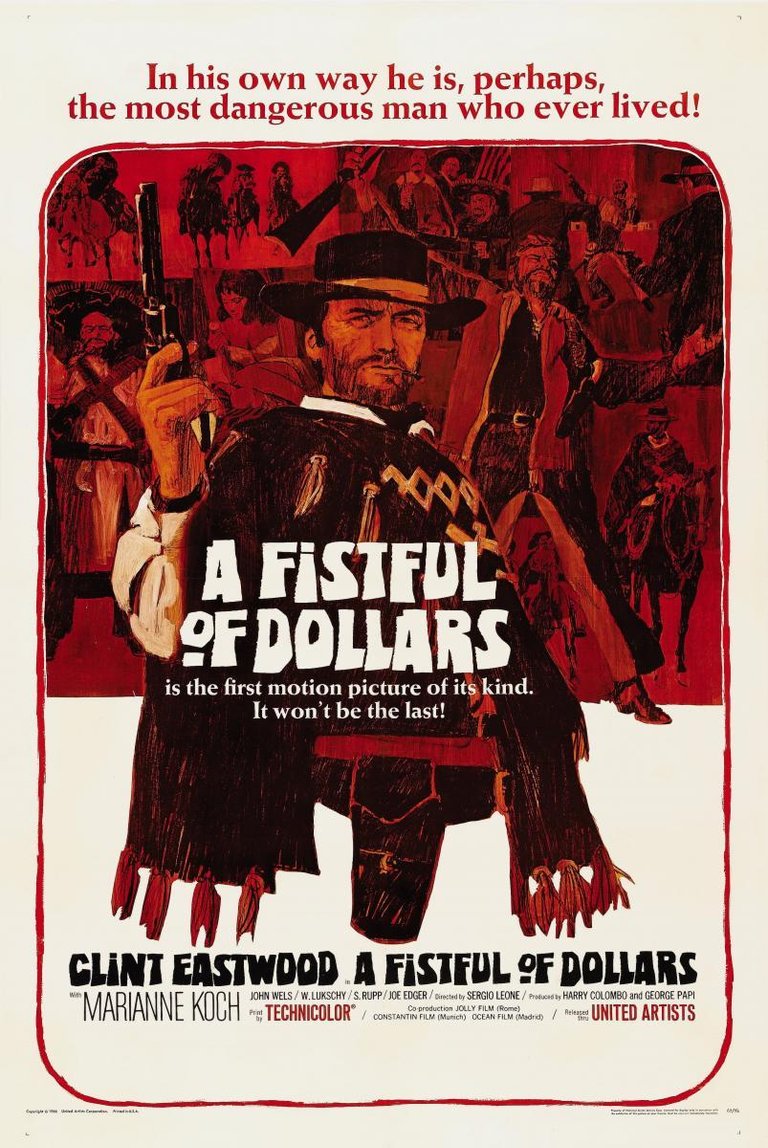

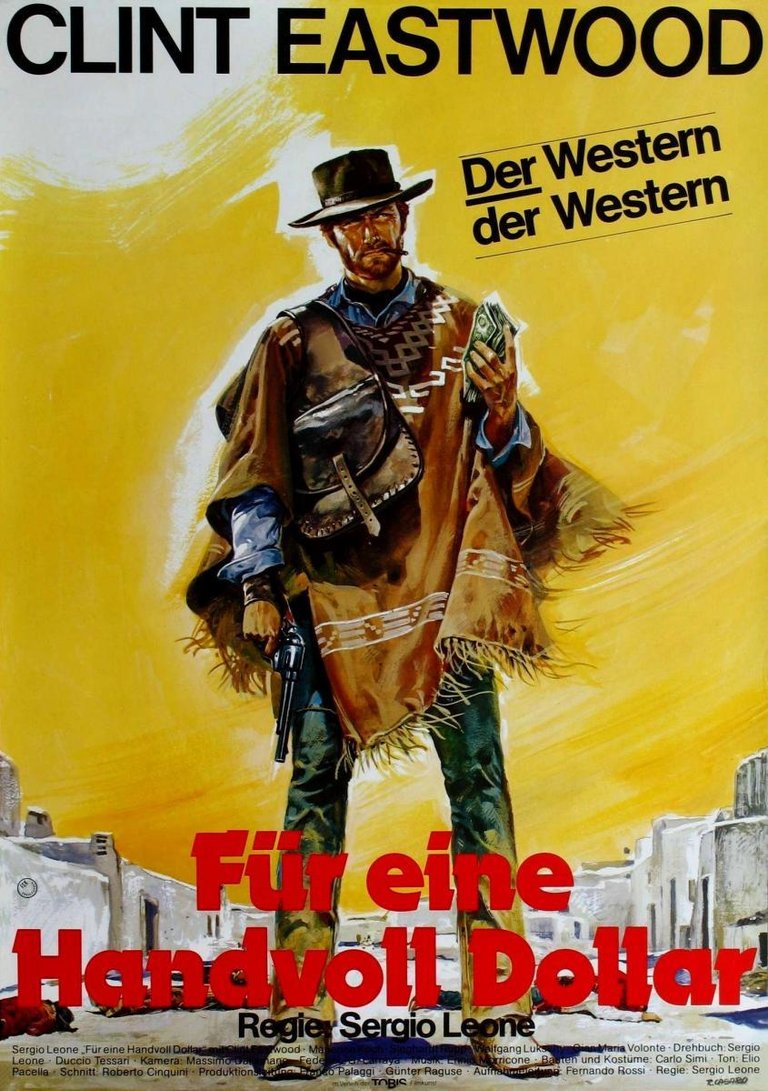
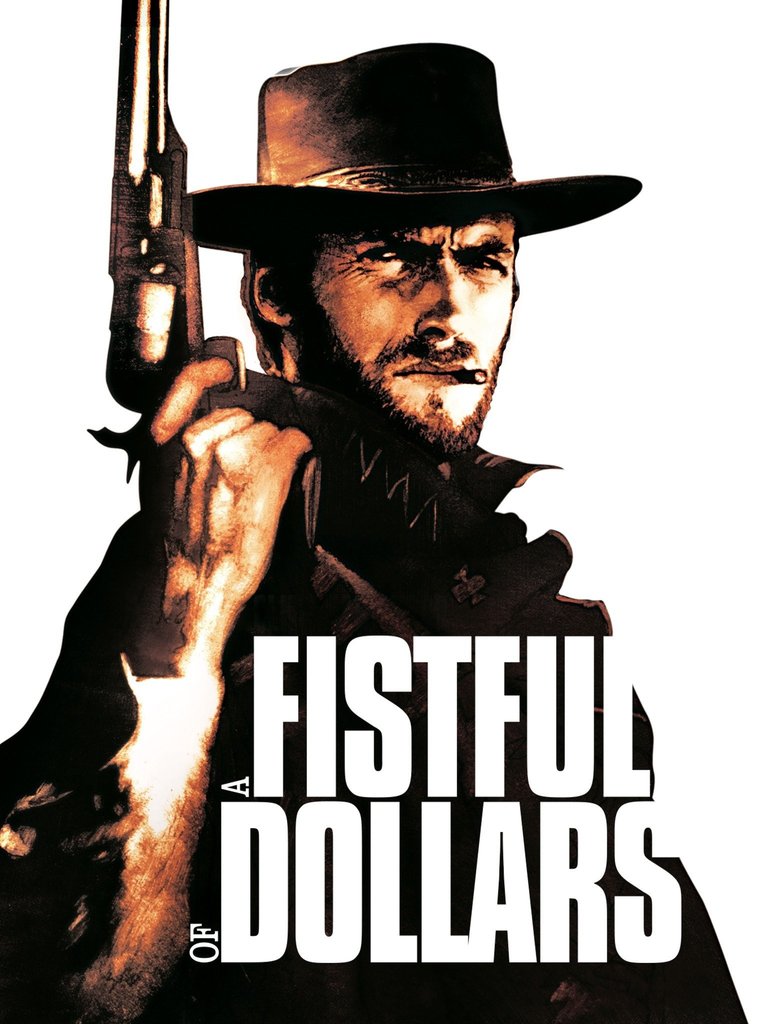
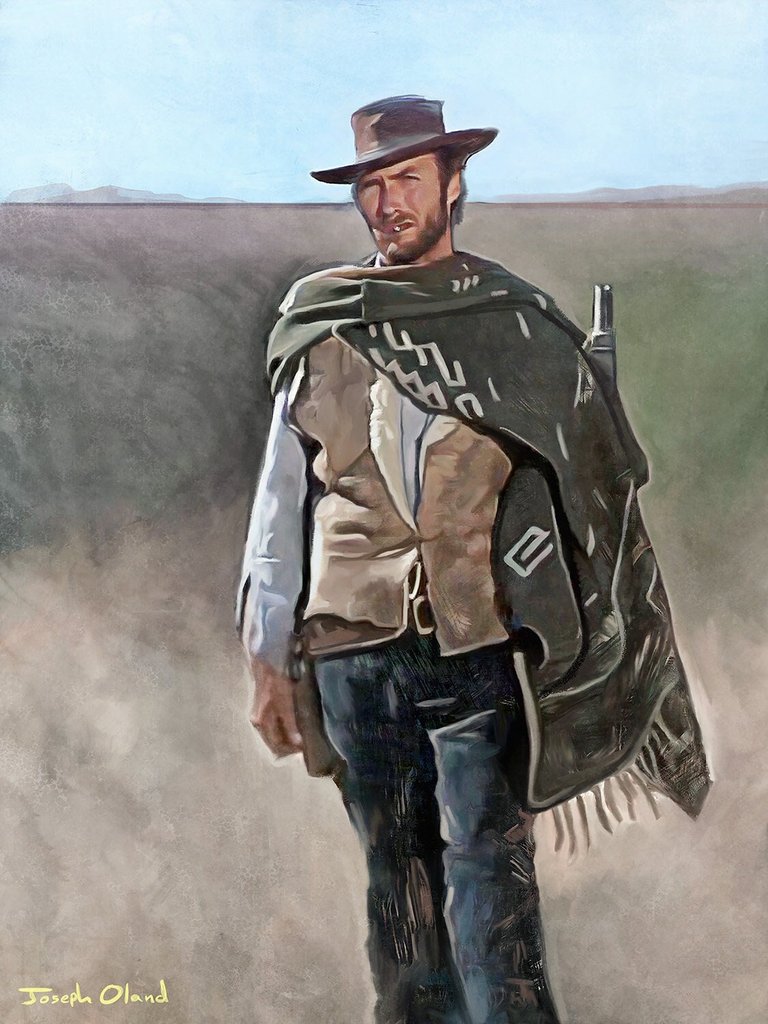
Fantastic movie
Un gran clásico, excelente película
¡Felicitaciones!
Estás participando para optar a la mención especial que se efectuará el domingo 15 de junio del 2025 a las 8:00 pm (hora de Venezuela), gracias a la cual el autor del artículo seleccionado recibirá la cantidad de 1 HIVE transferida a su cuenta.
¡También has recibido 1 ENTROKEN! El token del PROYECTO ENTROPÍA impulsado por la plataforma Steem-Engine.
1. Invierte en el PROYECTO ENTROPÍA y recibe ganancias semanalmente. Entra aquí para más información.
2. Contáctanos en Discord: https://discord.gg/hkCjFeb
3. Suscríbete a nuestra COMUNIDAD y apoya al trail de @Entropia y así podrás ganar recompensas de curación de forma automática. Entra aquí para más información sobre nuestro trail.
4. Visita nuestro canal de Youtube.
Atentamente
El equipo de curación del PROYECTO ENTROPÍA
Muchas gracias por el apoyo. Saludos.
Hey, what a great review you've written! It's incredible that, considering how classic it is, I've never seen it. I always have it on my "to-watch" list, but for one reason or another, it never makes it. Of course, I can perfectly place Clint Eastwood with his poncho and Morricone's music in the background... that's pop culture! But the way you describe the plot, with him arriving in that town to play both sides, you've sparked my tremendous curiosity. It sounds like he's a super cunning and calculating character.
I totally recommend the whole trilogy. Second movie is even better than the first And the last one is a masterpiece! Thanks for reading my post